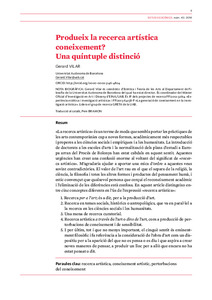Produeix la recerca artística coneixement? Una quíntuple distinció

Metadades
Mostra el registre d'unitat complet
Estudis escènics: quaderns de l'Institut del Teatre. 2018, Núm. 43
Tipus de documentArticle
Abstract
«La recerca artística» és un terme de moda que sembla portar les pràctiques de les arts contemporànies cap a noves formes, acadèmicament més respectables i properes a les ciències socials i empíriques i a les humanitats. La introducció de doctorats a les escoles d’arts i la normalització dels plans d’estudi a Europa arran del Procés de Bolonya han estat cabdals en aquest sentit. Aquestes urgències han creat una confusió enorme al voltant del significat de «recerca artística». M’agradaria ajudar a aportar una mica d’ordre a aquestes veus sovint contradictòries. El valor de l’art rau en el que el separa de la religió, la ciència, la filosofia i totes les altres formes i productes del pensament humà, i estic convençut que qualsevol persona que cerqui el reconeixement acadèmic i l’eliminació de les diferències està confosa. En aquest article distingeixo entre cinc conceptes diferents en l’ús de l’expressió «recerca artística»: 1. Recerca per a l’art; és a dir, per a la producció d’art. 2. Recerca en temes socials, històrics o antropològics, que va en paral·lel a la recerca en les ciències socials i les humanitats. 3. Una mena de recerca curatorial. 4. Recerca artística a través de l’art o dins de l’art, com a producció de pertorbacions de coneixement i de sensibilitat. 5. I per últim, tot i que no menys important, el cinquè sentit és eminentment filosòfic i fa referència a la consideració de l’obra d’art com un dispositiu per a la aparició del que no es pensa o es diu i que aspira a crear noves maneres de pensar, a produir un lloc per a allò que encara no ha estat pensat o dit. “Artistic research” is the buzzword that seems to bring contemporary art practices to new forms, which are more academically respectable and closer to the empirical and social sciences and humanities. The introduction of doctorates in art schools and the normalisation of school curricula in Europe because of the Bologna Process have been crucial here. Such urgencies have created enormous confusion over the meaning of “artistic research”. I would like to help bring some order to these often-contradictory voices. The value of art lies in what sets it apart from religion, science, philosophy and all other forms and products of human thought, and I believe that anyone who seeks academic recognition and the erasing of differences is confused. In this paper, I distinguish between five different concepts in the use of the expression “artistic research”: 1. Research for art, i.e. for the production of art. 2. Research on social, historical or anthropological subjects, which runs in parallel to research in the social sciences and humanities. 3. A kind of curatorial research. 4. Artistic research through art or in the medium of art, as a production of disturbances of knowledge and sensibility. 5. Last but not least, the fifth meaning is eminently philosophical and refers to the consideration of the work of art as a device for the emergence of what is not thought or said and aims to create new ways of thinking, to produce a place for what is not yet thought or said.
Condicions d'accésAccés obert
ISSN2385-362X
,
0212-3819
Col·leccions
- 2018: Núm.: 43 [15]

